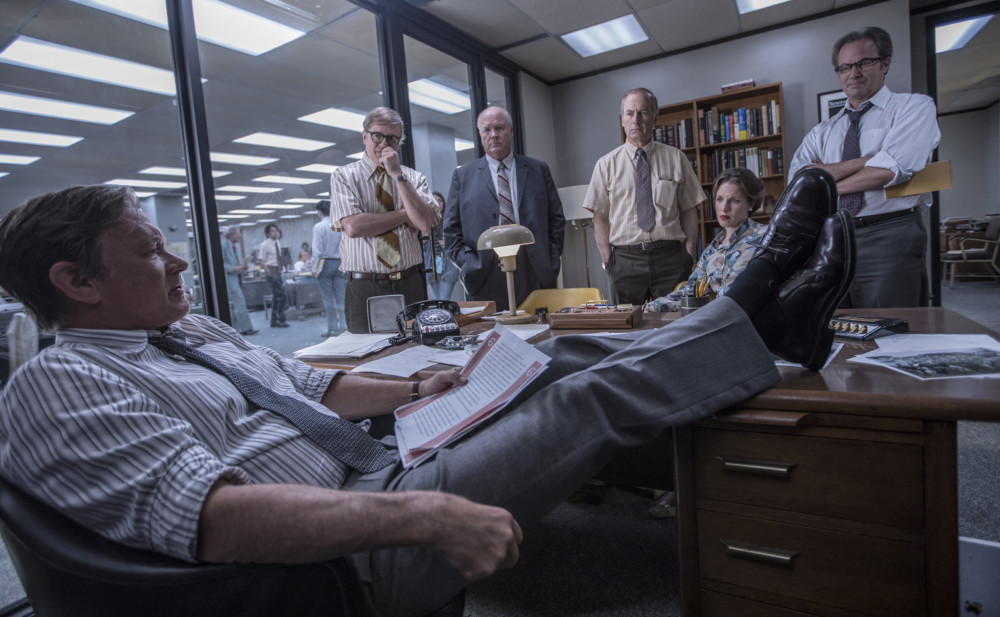By Moira Macdonald
The Seattle Times
WWR Article Summary (tl;dr) Columnist Moira Macdonald describes the movie like this, “The film is both a gripping and timely celebration of the free press, and, in the remarkable hands of Streep, an exploration of what it meant then (and, perhaps, now) to be a woman thrust into power in an all-male world.”
The Seattle Times
In a key moment in Steven Spielberg’s mesmerizing journalism drama “The Post,” Washington Post publisher Katharine Graham (Meryl Streep) is on a nighttime phone call, with several powerful men in her ear telling her, conflictingly, what she should do.
Agonized but trying to remain calm, she makes the decision (“Let’s go”), hangs up the phone, and raises a hand, palm flat, to the empty room around her, as if she’s pushing away any second thoughts.
Later, that same night, that hand gets raised again, but this time, it’s to a roomful of men, silencing them with a newfound imperiousness. “I’m talking to Mr. Bradlee now,” she says, in her dusky patrician voice; it’s as if she’s been transformed, in just a few hours.
Mr. Bradlee was Ben Bradlee (an agreeably blustering Tom Hanks), the legendary editor of the Post under Graham.
“The Post” mostly takes place during one week in 1971 as the two grappled with whether to publish the leaked Pentagon Papers, top-secret Department of Defense documents examining the U.S.’s role in the Vietnam War.
It’s an old-school movie in the very best of ways: a story-driven drama that’s paced almost like a thriller, taking us back to days when newspapers were assembled in hot type by men in fedoras (well, maybe that’s a costume designer’s flourish, but I’d like to believe it) and when suspense could be conveyed by some extremely dramatic Xeroxing.
The film is both a gripping and timely celebration of the free press, and, in the remarkable hands of Streep, an exploration of what it meant then (and, perhaps, now) to be a woman thrust into power in an all-male world.
Graham inherited the Post, which her wealthy father had bought in the 1930s and passed to her husband Philip, after Philip’s death by suicide in 1963.
At the time, as she tells her daughter in the film, she was busy raising children and giving parties; “I was never supposed to be in this job,” she says.
“The Post,” in its early scenes, shows us a tentative Graham, studying hard to prepare for the Post’s first public offering of stock (watch how Streep so subtly conveys Graham’s discomfort at a meeting, where she doesn’t quite know where to put the binders and notebooks she’s meticulously brought) and trying to coolly ignore the condescension with which she’s often treated.
Though Graham would later be known as the Iron Lady, the woman Streep portrays is far from that; there’s a heartbreaking moment in a meeting where she’s too nervous to speak up and the camera lingers on her dejected face, on which we read that she’s all too aware of her own failure.
We’ve seen Streep play women of steel, on numerous occasions; here she’s playing Graham as still forming, still molten.
By the film’s end, she’s changed, owning her role and reveling in it. “The Post” tells of a great moment in journalism, and a great moment in one remarkable woman’s life.
___
‘THE POST’
With Meryl Streep, Tom Hanks, Sarah Paulson, Bob Odenkirk, Tracy Letts, Bradley Whitford, Bruce Greenwood, Alison Brie, Carrie Coon.
Directed by Steven Spielberg, from a screenplay by Liz Hannah and Josh Singer.
Running time: 115 minutes.
Rated PG-13 for language and brief war violence.














































































































































































































































































































































































